Makowiec: The Most Scandalous Cake in the World?
Eating the infamous poppy seed cake known as makowiec, one of Poland’s most popular sweet foods, is also a scandalising way to put morphine into your system. Culture.pl looks at its seemingly innocent past along with some of its run-ins with the law.
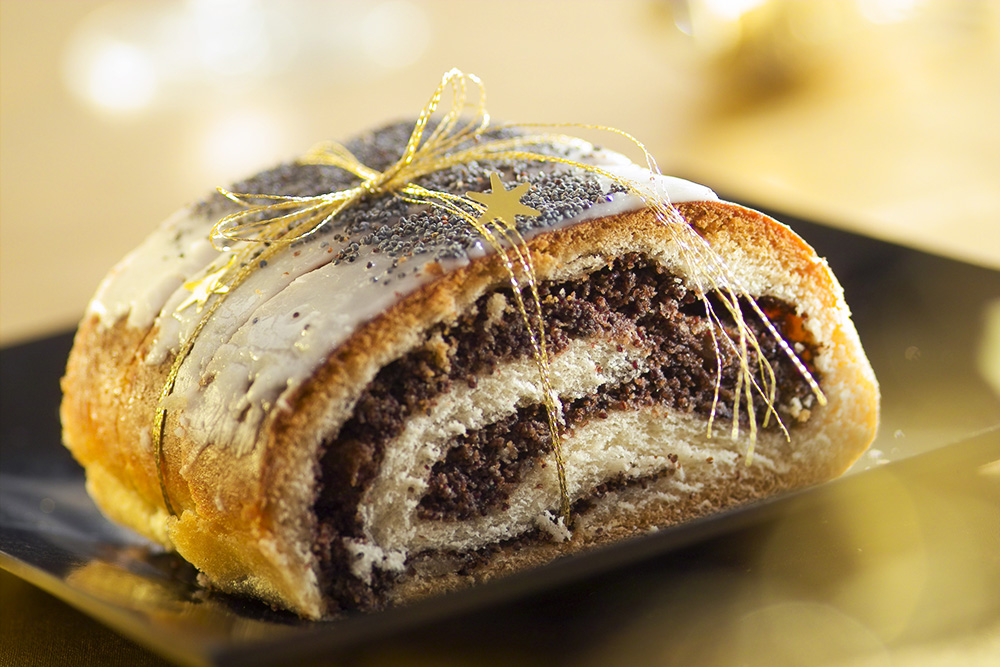 Makowiec, photo: East News
Makowiec, photo: East NewsSeemingly innocuous
Makowiec (pronounced: Mak-ov-yetz) is a strudel-like, yeast poppy seed cake that’s one of Poland’s most popular desserts. It’s main attraction is the filling spun inside, made of finely-ground poppy seeds, honey, butter, raisins and walnuts. When made right, the cake is absolutely delicious. It’s safe to say that many a poppy-seed cake lover would agree that the more the filling, the better.
That’s especially true in the case of those who prefer the variety Makowiec Lubartowski, made in the area of Lubartów, a town in eastern Poland. The cake consists of almost nothing other than poppy seeds. On the website of Poland’s Ministry of Agriculture and Rural Development, they write:
Makowiec lubartowski is characterised by having a thin layer of dough and thick layer of poppy filling. (...) Makowiec is definitely the most Polish of Polish cakes.
Actually, the Lubartów makowiec is so popular that there’s even a song about it, written by Mrs. Agnieszka Kośkiewicz from Dominów, a village near to Lubartów. Here’s our translation of its first verse:
There’s no match for
The Lubartów makowiec
Its aroma! Its flavour!
Curls of sweet poppy seeds!
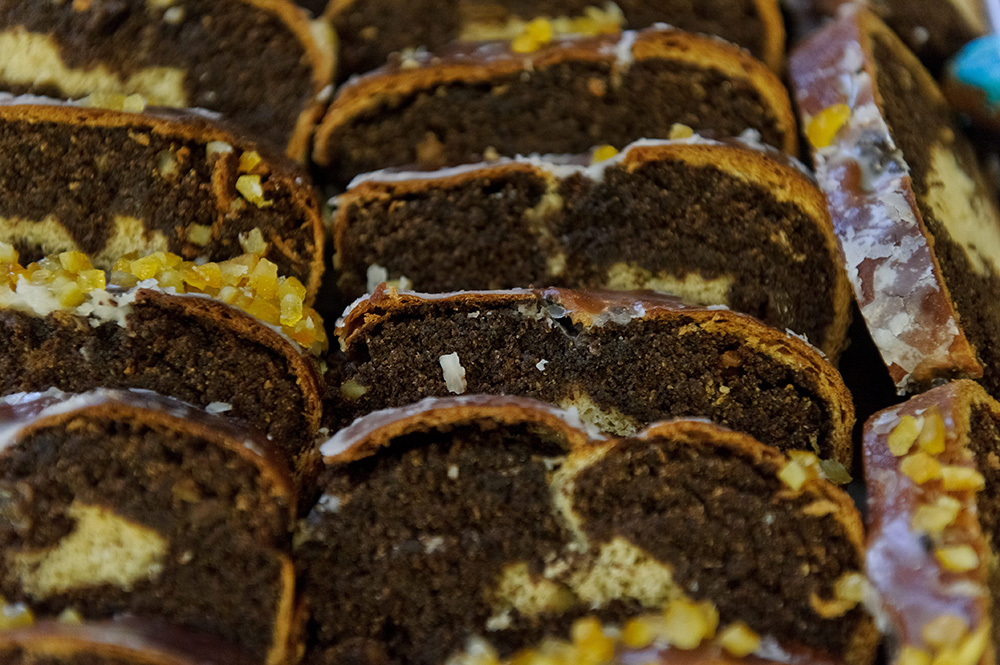 Lubartów makowiec, Maria Siej’s pastry shop in Lubartów, photo: Wojciech Pacewicz / PAP
Lubartów makowiec, Maria Siej’s pastry shop in Lubartów, photo: Wojciech Pacewicz / PAP
But whatever the volume of poppy seed stuffed into it, makowiec is a very traditional food in Poland, and is a must during Easter and Christmas. This custom may be linked to apocryphal Christian legends which claim poppies sprouted from where the blood of Jesus fell during his crucifixion. But poppies were symbolically linked to beliefs regarding the afterlife in pre-Christian times too – the Slavs considered them plants that enabled you to cross the boundary between life and death. They even used poppy seeds to make dishes meant for the dead who, as ancient faith had it, would come back every now and then to visit the living.
Makowiec also appears in stories later in history. For example, in 1681 the royal baker of Jan III Sobieski apparently prepared a huge makowiec embellished with a representation of the king’s beloved wife Marysieńka, much to the ruler’s amusement. Another Polish king, Stanisław August Poniatowski, is said to have once received one over 4 metres long.
Enter the cake dark side
 Nineteeth-century Chinese smokers in an opium den, photo: New York Public Library / East News
Nineteeth-century Chinese smokers in an opium den, photo: New York Public Library / East News
But this cake isn’t just about mythology, customs and history. Makowiec is a scandaliser. Its high content of poppy seeds is responsible for a reputation for putting morphine into your system.
As you probably already know, poppies are what opium, morphine and heroin are made from, as the seeds are a natural source of opiate. Pastry cooks know this, and your local law enforcement knows this. That’s why you should only use seeds from special kinds of poppies that have a very low morphine content to make the cake. But even though this rule is strictly abided by, the cake can still cause morphine-related legal problems.
To a Pole, this poppy seed cake is as natural as a croissant to a Frenchman or an apple strudel to an Austrian. Even though it’s considered festive in Poland, you can encounter makowiec on a daily basis here. People often have miniature versions of the cake as a snack, for breakfast even. And obviously, no one really thinks of these foods as drugs in any way as they’re not getting high on them. Even if you did somehow manage to devour an entire makowiec, you wouldn’t feel intoxicated – you’d probably just end up feeling like you’ve unnecessarily eaten a kilo of a very rich food...
Accused by academics
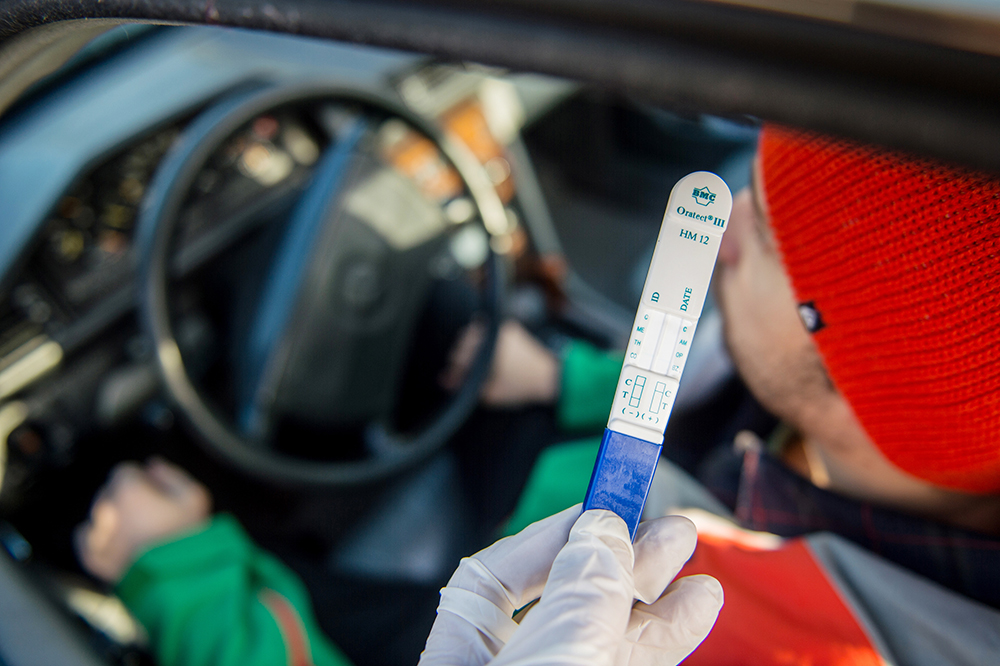 A driver being tested for drugs – an illustration, photo: Daniel Dmitriew / Forum
A driver being tested for drugs – an illustration, photo: Daniel Dmitriew / Forum
Despite this innocence, eating this completely legal cake can result in testing positive for morphine. The poor victims of this effect don’t feel the least intoxicated, but from a legal standpoint, they appear to have an excessive amount of morphine piping through their veins.
Although this sounds absurd at first, in Poland this actually isn’t a joke. For instance, the periodical Problemy Kryminalistyki (editor’s translation: Issues in Forensics) published by Poland’s Central Forensic Laboratory of the Police devoted a lengthy 2008 article to the problem. Its rather stiff and awkward title roughly translates as Testing the Level of Morphine in Bodily Fluids of Persons That Have Consumed Food Products Containing Poppy Seeds and Its Marking On Such Products. Without discussing the topic of analysing bodily fluids in detail, let’s just quote part of the article’s conclusion:
Discovering morphine in bodily fluids may point not only to taking opiate narcotics but also to the consumption of pastry products containing poppy seeds.
The article explains that you can test positive for morphine several hours after you've had a regular piece of cake, depending on your metabolism and other subtle individual characteristics.
A rambling junkie
 Miami State Drug Court Judge Jeffrey Rosinek, left, and John P. Walters, Director of National Drug Control Policy, during a news conference, 2005, photo: Pat Carter / AP
Miami State Drug Court Judge Jeffrey Rosinek, left, and John P. Walters, Director of National Drug Control Policy, during a news conference, 2005, photo: Pat Carter / AP
The Polish writer and journalist Piotr Milewski found that out for himself during a year-long rehab programme in America. A court judge ordered him to enter it after he had been mistaken for a drug dealer by policemen raiding a New York night club where Milewski had been partying. Part of the programme’s drill was that Milewski had to be regularly tested for drugs. On Christmas Day in 2006, after he had had a piece of poppy seed cake for lunch, he tested positive for morphine… Here’s how he described the situation with the attending rehab nurse in his 2007 book Year of the Dog:
‘It’s probably from the poppy seed cake. I ate a bit of leftover Christmas poppy cake for lunch. It’s this cake,’ I explain.’ In Poland you make it for Christmas. When I was little I used to make it with my Grandma. It looks like a strudel but the filling’s made of poppy seeds instead of apples. (…) Generally, we eat a lot of poppy seeds during the Holidays.’ (…) The more I talk about the intricacies of Polish cuisine, the more I realise that my explanations sound depressing. I’m listening to my monologue as if it were delivered by a junkie standing next to me.
Indeed, to someone unfamiliar with the mysteries of Polish Holidays these excuses must’ve sounded unconvincing. Fortunately, the incident didn’t lead to any serious trouble and the writer ended up all right. But had he met less forgiving people on his way, the ending of his anecdote wouldn’t necessarily be a happy one.
A chain of smack?
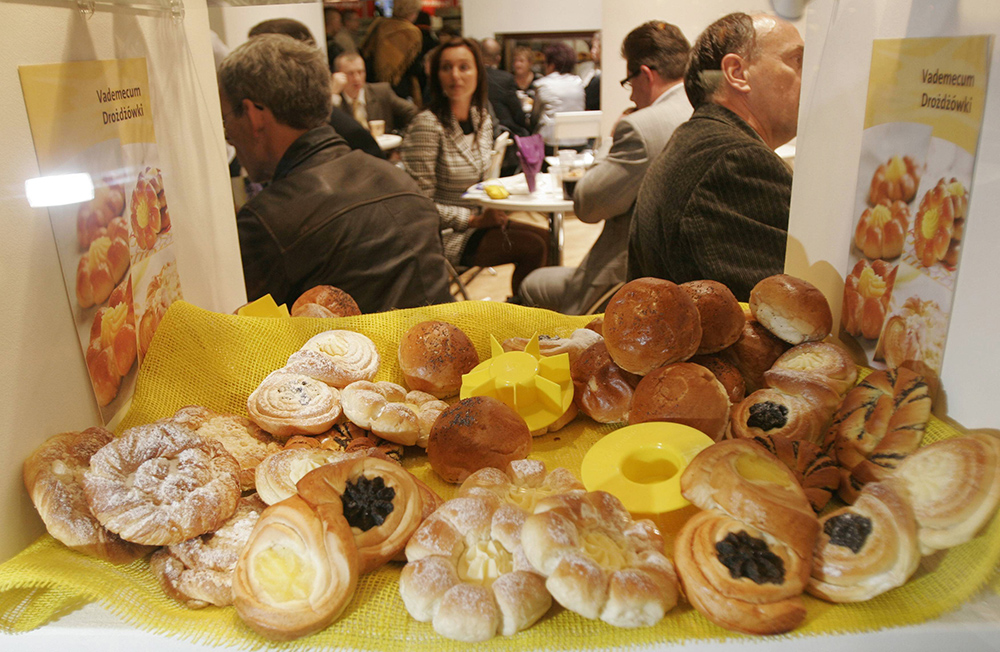 Sweet rolls, photo: Piotr Skórnicki / AG
Sweet rolls, photo: Piotr Skórnicki / AG
In October 2014, the Kraków-based newspaper Gazeta Krakowska published the following news:
Sweet rolls containing poppy seeds with a high morphine content instead of comestible poppy seeds were sold by a store chain in Kraków. A few people are in the hospital, they’ve tested positive for morphine.
The whole affair started when a Kraków woman was undergoing routine medical tests at a hospital. Upon finding morphine in her system, it seemed the only potential culprit she could think of was the sweet poppy roll she had eaten earlier that day. A few hospital workers decided to check out her story and tried some poppy rolls sold by the same chain. Wouldn’t you know it – morphine also appeared in their systems.
Fortunately, none of the Cracovians experienced any intoxication or health issues. They must have counted themselves lucky it wasn’t the poppy-stuffed version from Lubartów mentioned earlier...
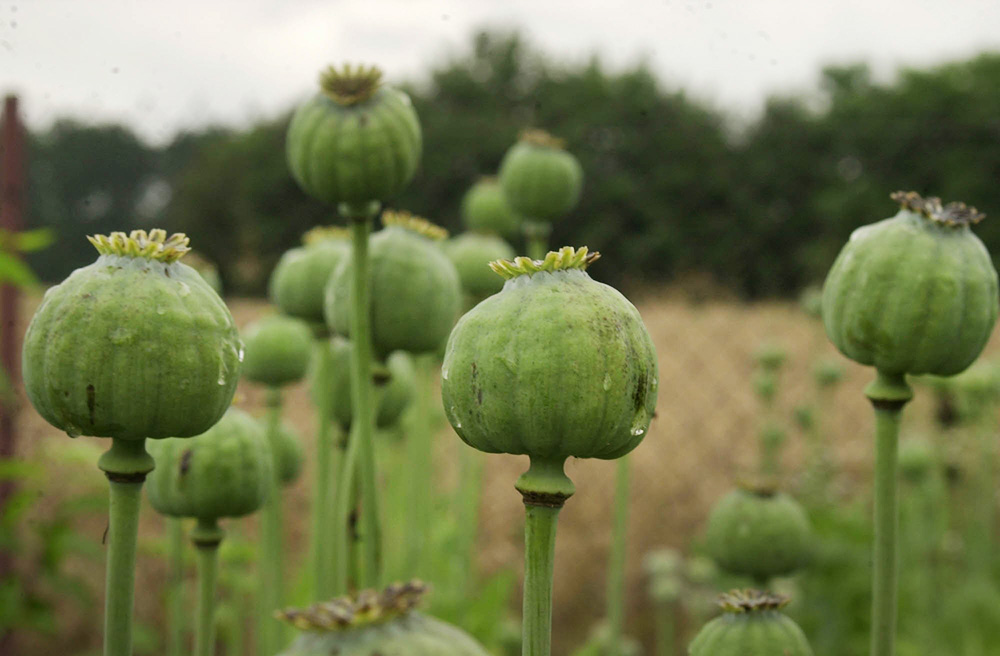 A plantation of poppies, photo: Witold Rozbicki / Reporter
A plantation of poppies, photo: Witold Rozbicki / Reporter
The story of the scandalising Kraków rolls, however, quickly became a sensation and enjoyed plenty of media coverage in Poland. Many Poles became convinced morphine had become readily available from nefarious Kraków bakers, their chain of stores no doubt a front for a drug ring. The Institute of Forensic Research in Kraków tried to calm things down and analysed samples of the besmirched baked good. They concluded that they couldn’t be certain whether it was actually made of poppy seeds with a high morphine content. Either way, they found the rolls posed no health hazard, so in view of that no charges were pressed against the store chain.
So as you can see, makowiec has quite the reputation. One that’s caused not solely by its irresistible flavour… If you want our advice, don’t ever eat one before applying for a security job!
Author: Marek Kępa, September 2017
[{"nid":"5688","uuid":"6aa9e079-0240-4dcb-9929-0d1cf55e03a5","type":"article","langcode":"en","field_event_date":"","title":"Challenges for Polish Prose in the Nineties","field_introduction":"Content: Depict the world, oneself and the form | The Mimetic Challenge: seeking the truth, destroying and creating myths | Seeking the Truth about the World | Destruction of the Heroic Emigrant Myth | Destruction of the Polish Patriot Myth | Destruction of the Flawless Democracy Myth | Creation of Myths | Biographical challenge | Challenges of genre | Summary\r\n","field_summary":"Content: Depict the world, oneself and the form | The Mimetic Challenge: seeking the truth, destroying and creating myths | Seeking the Truth about the World | Destruction of the Heroic Emigrant Myth | Destruction of the Polish Patriot Myth | Destruction of the Flawless Democracy Myth | Creation of Myths | Biographical challenge | Challenges of genre | Summary","topics_data":"a:2:{i:0;a:3:{s:3:\u0022tid\u0022;s:5:\u002259609\u0022;s:4:\u0022name\u0022;s:26:\u0022#language \u0026amp; literature\u0022;s:4:\u0022path\u0022;a:2:{s:5:\u0022alias\u0022;s:27:\u0022\/topics\/language-literature\u0022;s:8:\u0022langcode\u0022;s:2:\u0022en\u0022;}}i:1;a:3:{s:3:\u0022tid\u0022;s:5:\u002259644\u0022;s:4:\u0022name\u0022;s:8:\u0022#culture\u0022;s:4:\u0022path\u0022;a:2:{s:5:\u0022alias\u0022;s:14:\u0022\/topic\/culture\u0022;s:8:\u0022langcode\u0022;s:2:\u0022en\u0022;}}}","field_cover_display":"default","image_title":"","image_alt":"","image_360_auto":"\/sites\/default\/files\/styles\/360_auto\/public\/2018-04\/jozef_mroszczak_forum.jpg?itok=ZsoNNVXJ","image_260_auto":"\/sites\/default\/files\/styles\/260_auto_cover\/public\/2018-04\/jozef_mroszczak_forum.jpg?itok=pLlgriOu","image_560_auto":"\/sites\/default\/files\/styles\/560_auto\/public\/2018-04\/jozef_mroszczak_forum.jpg?itok=0n3ZgoL3","image_860_auto":"\/sites\/default\/files\/styles\/860_auto\/public\/2018-04\/jozef_mroszczak_forum.jpg?itok=ELffe8-z","image_1160_auto":"\/sites\/default\/files\/styles\/1160_auto\/public\/2018-04\/jozef_mroszczak_forum.jpg?itok=XazO3DM5","field_video_media":"","field_media_video_file":"","field_media_video_embed":"","field_gallery_pictures":"","field_duration":"","cover_height":"991","cover_width":"1000","cover_ratio_percent":"99.1","path":"en\/node\/5688","path_node":"\/en\/node\/5688"}]